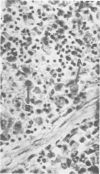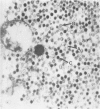Abstract
Two outbreaks of marble spleen disease were observed in pen-raised pheasants in Ontario on the same farm in the summer of 1971 and in 1972. In both instances, a mortality of 3% per day lasted for approximately 14 days. Fifteen birds were necropsied and tissues removed and examined histologically and by electron microscopy. In addition splenic material was injected into adult pheasants. The gross lesions, characterized by enlarged greyish-white mottled spleens and acute congestion and oedema in the lungs, were identical to those described by previous authors. Histological examination of livers, lungs, spleens and proventriculi revealed some reticular-type cells which contained either an eosinophilic or a basophilic intranuclear inclusion. Electron microscopy of the affected spleens revealed cells with massive intranuclear accumulations of virus particles. Although transmission trials failed, the evident histological and electron microscopy lesions confirm the suggestion by other authors that this is a viral disease affecting the reticulo-endothelial system.
Full text
PDF





Images in this article
Selected References
These references are in PubMed. This may not be the complete list of references from this article.
- Jakowski R. M., Wyand D. S. Marble spleen disease in ring-necked pheasants: demonstration of agar gel precipitin antibody in pheasants from an infected flock. J Wildl Dis. 1972 Jul;8(3):261–263. doi: 10.7589/0090-3558-8.3.261. [DOI] [PubMed] [Google Scholar]
- Wyand D. S., Jakowski R. M., Burke C. N. Marble spleen disease in ring-necked pheasants: histology and ultrastructure. Avian Dis. 1972 Jan-Mar;16(2):319–329. [PubMed] [Google Scholar]






